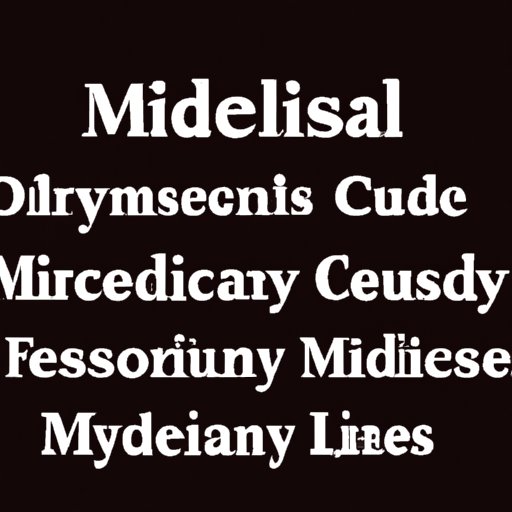Introduction
Have you ever wondered why you have a middle name? This seemingly insignificant addition to our names is often overlooked and taken for granted. However, middle names have a rich history and cultural significance that date back centuries. In this article, we will explore the origins and cultural significance of middle names, the psychological impact they can have on personal identity and self-expression, practical uses, famous examples in pop culture and politics, and modern trends in middle name usage.
Historical origins and cultural significance of middle names around the world
The use of middle names can be traced back to early Roman times, where it was used to denote family name and lineage. In Europe during the Middle Ages, middle names were often given as a way to honor a saint, and in some cultures, middle names indicate the family or clan to which one belongs.
Today, middle names are used in various ways across different cultures. In some European countries, such as France and Italy, it is common to have two or more middle names. In Hispanic cultures, individuals usually have both their mother’s and father’s last names, and a middle name is often added for religious symbolism. In some Asian cultures, the middle name is chosen based on the auspiciousness of the sound and meaning of the name.
The significance of middle names varies greatly across cultures and traditions. In America, it is often seen as an opportunity for parents to choose a unique name for their child. In some cultures, middle names are believed to bring good luck or ward off evil spirits, making it an important part of an individual’s identity.
The psychological impact of middle names on personal identity and self-expression
Personal identity plays a crucial role in an individual’s mental and emotional well-being. The concept of personal identity revolves around how one sees themselves in relation to others and the world around them. It can be affected by numerous factors such as family background, culture, and personal experiences.
Research has shown that the inclusion of a middle name can improve a person’s sense of self-expression and self-identity. Middle names can add a level of personal identity and individualism to a name, allowing individuals to feel more connected to their names and their personal identity.
Furthermore, some individuals choose to change their middle name to better reflect who they are, or to disassociate from negative parts of their past. For example, transgender individuals often choose to change their middle name as a way of expressing their true gender identity.
Practical uses of middle names in legal documents, genealogy research and social customs
While middle names may seem like just another component of our names, they can serve practical purposes as well. One of the most common reasons for using a middle name is for legal documents. In the case of individuals with common names, middle names make it easier to identify them accurately.
In genealogy research, middle names can be essential in tracing family lineage. It can help identify specific individuals in a family tree and differentiate between individuals with the same first and last name.
Additionally, middle names have cultural significance in some social customs. In some cultures, the middle name is used as a form of address, a way of showing respect and honor to another individual.
Famous examples of middle names in pop culture, literature and politics and their meanings behind them
From pop culture to politics, middle names have played an important role in shaping our perception of some of the most famous individuals in history.
For example, author J.K. Rowling’s middle name is “Kathleen,” which she adopted from her grandmother. Similarly, actress Emma Stone’s middle name is “Jean,” which was her maternal grandmother’s name.
Politicians also commonly use their middle name as part of their public persona. Former President Barack Obama’s middle name is “Hussein,” which has religious significance in the Muslim faith. Former President Harry S. Truman’s middle name “S” does not stand for a particular name; he chose “S” as a way of honoring both of his grandfathers, whose names both started with the letter S.
Evolution and modern trends of middle name usage, including alternative spellings, hyphenated names, and non-traditional choices
The usage of middle names has changed over time, with some parents opting for unique choices or dropping the middle name altogether. One trend is to use alternative spellings of traditional names for middle names, such as “Kathryn” instead of “Catherine.”
Another trend is to use hyphenated names or double-barrelled names, such as “Mary-Kate” or “Jean-Luc,” which can add a level of uniqueness and individualism to a name.
Finally, some parents choose to forgo traditional names altogether and choose non-traditional middle names, such as words or phrases that hold personal significance to them. Some examples of non-traditional middle names include “Sunshine,” “Danger,” and “Infinity.”
Conclusion
In conclusion, middle names may seem like an insignificant part of our names, but they hold great cultural and personal significance. From honoring family lineage to enhancing personal identity and self-expression, middle names play a crucial role.
Whether we choose to embrace traditional names or opt for non-traditional choices, our middle names are an important part of our identity. No matter what we choose, our middle names offer a unique opportunity to express who we are and where we come from in a meaningful way.
